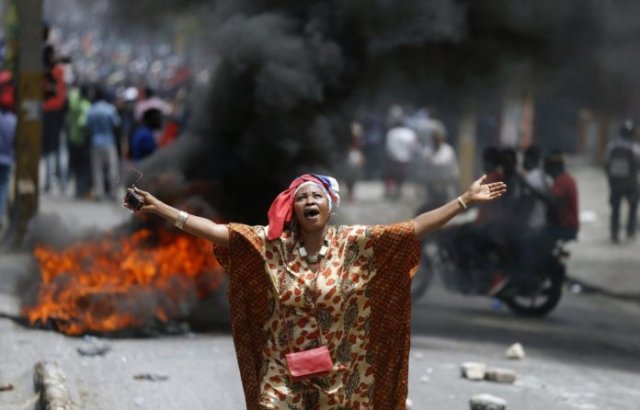President Jovenel Moise by staying in power despite the country’s constitution has triggered a serious political crisis. Virtually all organised bodies including the judiciary, religious organisations, professionals, popular and trade union movements are calling for resistance. Outside the country, the United States and its faithful ally Canada are clinging to the thuggery that has been raging in this country for the past decade.
The implosion
Jovenel and his predecessor, Michel Martelly, destroyed just about everything, plundering state revenues and huge Venezuelan aid ($4 billion) in what became the Petro-Caribe scandal. Infrastructure remains in ruins since the 2010 earthquake, unemployment affects more than half the population, 50% of the country lives below the poverty line. Peasants, fleeing the countryside, are accumulating in shantytowns under the prey of militarised mafia gangs, who act with impunity. Poverty is aggravated by the pandemic, the collapse of health infrastructures, and the lack of coordinated international aid.
The revolt
Throughout 2019 and 2020, popular protests continued to challenge this power. Young people have been at the forefront in the capital, from decentralised collectives that coordinate via social media. Powerful peasant movements control regions, especially in the north of the country.
All-out repression
In this context, repression has become the main form of governance. Large-scale massacres, machine-gunning of unarmed demonstrators and, increasingly, the terror of armed gangs acting under police protection through kidnappings and killings, try to contain the multitude.
Impasses
If the semblance of a state persists, it is certainly in large part due to the complicity of the so-called "international community". Another factor, and not the least, is the division of the opposition. The political formations are divided between "moderates" (who would like a negotiated and orderly departure from Jovenel, with the support of certain foreign states) and "radicals" who hope for a process of refoundation. Both are divided into sub-fractions that are often imposed by clientelism. However, various processes are underway to reunite the galaxy of opposition at a time when power is literally in the brook.
Resources
The current crisis
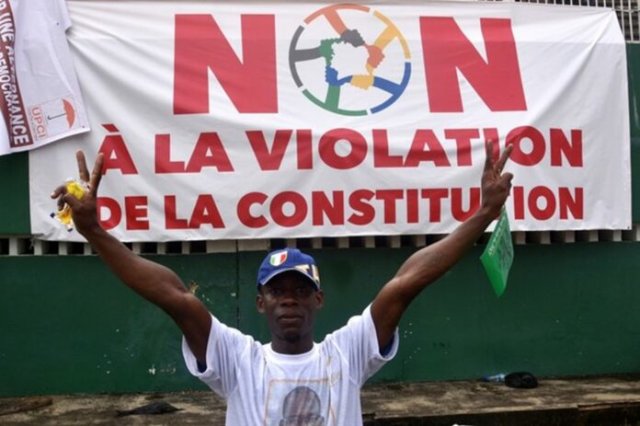
Haiti: Midnight and Five, 6 February 2021
Armed gangs remotely controlled by the regime are sowing terror in Port-au-Prince in the working-class neighbourhoods to the detriment of the population. The government uses them as a force of repression. The latter, chaired by Jovenel Moïs, is supported by the "Core Group", composed of the United States, Canada and France. The intervention of these powers in the national political game is in addition to that of external actors such as "international aid", foreign advisers or NGOs who dominate humanitarian aid. Faced with all these actors, youth resistance groups are organising themselves. The popular movement that has been taking place in Haiti for the past two years is of considerable scope and is anchored in the long term. It is preparing for a long and trying struggle to counter the regime of President Jovenel Moïse.
Haiti: a revolution that comes from afar, 4 February 2021
On February 7, 1986, Jean-Claude Duvalier was shipped by the United States to France after 29 years of dictatorial rule and the assassination of thousands of citizens. His government was notably supported by the United States, France and Canada. After his departure, the United States handed over power to a civil-military junta led by General Henri Namphy. The revolt movements that followed his departure were marked by intense violence. Inter-individual or inter-clan struggles also erupted and led to the multiplication of presidential candidacies, supported by the White House. The aborted elections of 1987 resulted in the massacre of voters following threats by Duvalierists to disrupt election day. Since then, many economic and social disasters have occurred in the country, but the struggle of the Haitian people to end the misery continues.
International dimensions
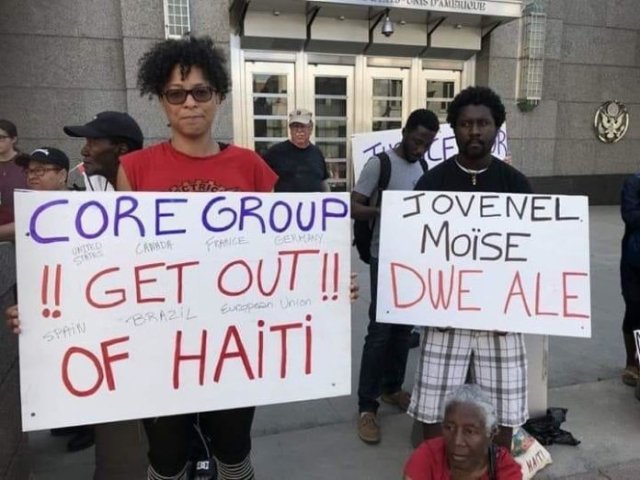
Haiti: the international community goes against the tide, 8 February 2021
For more than two years, an unprecedented social movement against impoverishment and corruption, the negligence of the government and its complicity with armed gangs has been shaking Haiti. Since the beginning of February 2021, a general strike organised by a coalition of unions has been widely followed. The international community aligns itself with Washington and continues to support the president, who has nevertheless "openly abused the situation" according to the Haitian Bar Federation.
Haiti: Canada must stop all support to Jovenel, February, 7 February 2021
The Concertation for Haiti is writing an opening letter in support of the many Haitian civil society groups that are calling on people around the world to "show solidarity with the Haitian people in their efforts to rid themselves of the criminal, retrograde, corrupt and dictatorial regime". The letter calls for an end to the international community’s support for Jovenel Moïse’s criminal and unconstitutional regime and for respect for the Haitian people’s right to self-determination.
Stop Silence Haiti, 28 January 2021
82 organisations from Haiti, France, Belgium, Canada, Spain, Germany and Benin are joining forces in a "Stop Silence Haiti" campaign to end the silence and international complicity with the Haitian government, which widely practises corruption and abuse of power. The appeal calls for an end to the silence and indifference that stifle Haitian demands and an end to impunity in Haiti.
Haiti: the new manipulations of the Core Group, 5 December 2020
The Core Group, a body supporting the current regime, has called for an early democratic renewal for Haiti in 2021. Leaders of the traditional opposition have expressed dissatisfaction with this desire to accelerate the upcoming electoral process. They consider it flawed, flawed, inconsistent and illegal. Some members of the opposition are calling on the population to mobilise to defeat any election in the current conditions of socio-economic crisis and insecurity.
Haiti: the United States complicit in the repression, 5 September 2020
In November 2019, the US State Department entered into a contract for the supply of "riot kit[s]" with the Haitian National Police. The US financial support to the Haitian police is emblematic of the strengthening of the status quo in Haiti through US assistance. This equipment provided by US institutions is used to violently repress demonstrations. In addition, weapons manufactured in the United States feed the Haitian market and end up in the hands of criminal groups, resulting in the death of many civilians.
Haiti: Western countries financed the parody of democracy, 22 August 2020
Lyonel Trouillot is a novelist, poet, journalist and professor of literature and looks back on the dramas experienced by his fellow Haitians. In particular, he tackles the subject of the lack of support from the West for the Haitian people who are fighting for a real democracy, under the pretext of formalism. The Haitian people’s demands concern the profound changes to be made in the functioning of the State, in social relations and in the defence of liberties.
A decaying power
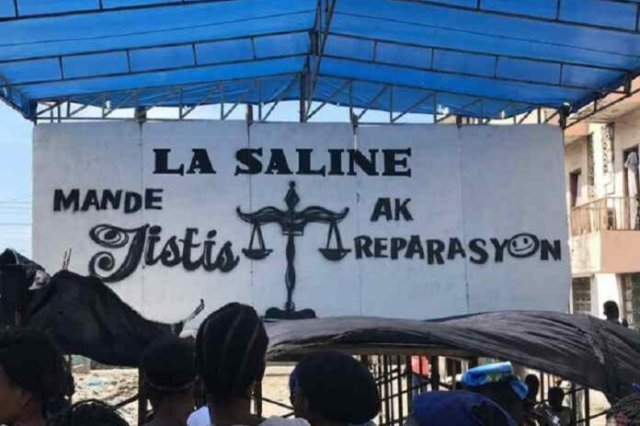
Haiti: the failure of a reconstruction policy, 17 January 2021
In February 2010, the devastating and deadly earthquake that struck Haiti destroyed many of the country’s cities and caused a considerable number of deaths. In the aftermath of the disaster, the government approached the reconstruction project as a "support for the transformation of the state" in the sense of a more balanced reconstruction of society at the social, environmental and territorial levels. The current failure of this project can be explained by the neo-liberal policy choices made by the Haitian government, coupled with the maintenance of this programme under the aegis of an organisation designed and run by "foreigners" in the political and economic field.
Haiti: kidnappings must be stopped, 9 January 2021
Every day in Haiti, people are kidnapped, held captive and released for ransom, or executed if the ransom is not paid. The laxity of the authorities coupled with the demolition of legislative and judicial counter-powers by the government in power contributes to the impunity of the perpetrators of these kidnappings.
Haiti: the role of the militias in the massacres, 5 January 2021
Two decrees relating to the creation of a national intelligence agency and the strengthening of public security published by the Moise-Jouthe government have been strongly criticised for the attack they pose on individual liberties and the functioning of opposition groups. One of them endorses the formation of a new armed militia with more powers than the judiciary or the police. The latter measure follows on from the 40 years of the Haitian state’s operation through paramilitary militias.
Haiti: an authoritarian regime supported by crime, 13 December 2020
The alliance of power with criminal gangs has led to particularly violent massacres. This is particularly the case of the massacre of 13 November 2018 in Port-au-Prince in the popular district of La Saline, perpetrated with the aim of repressing and terrorising participants in demonstrations. This massacre led to the adoption for the first time of sanctions by the United States against key figures in the regime. The United States, the "kingmaker and main political actor in Haiti", had until this event shown unfailing support for President Jovenel Moïse despite the country’s collapse.
Haiti: between massacres and impunity, 24 November 2020
In November 2020, Haitians continued to demand justice for the massacre in the popular Saline district committed on 13 and 14 November 2018. The police, despite being alerted, did not intervene to stop the killings with axes and machetes, decapitations and rapes committed during these two days of massacre. These events received little media coverage and were hardly denounced by the United States, France, the European Union or other international bodies and by President Jovenel Moïse. Since then, several other massacres have been perpetrated. The international "Stop Silence Haiti" campaign aims to end the silence and impunity that reigns in the situation.
Haiti: an illegitimate government in the face of the health crisis, 14 October 2020
Colonial debts, foreign occupations, IMF injunctions have impoverished Haiti, which is now extremely vulnerable to the covid-19 pandemic. This history explains the failure of the health infrastructure in place, in addition to the government’s lack of credibility and transparency and the accusations of corruption made against them in the management of the crisis. The PAPDA (Platforme Haïtienne de Plaidoyer pour un Développement Alternatif) urges the Haitian state to take adequate food-related measures to address the food and nutrition crisis caused by the pandemic.
The opposition and popular movements
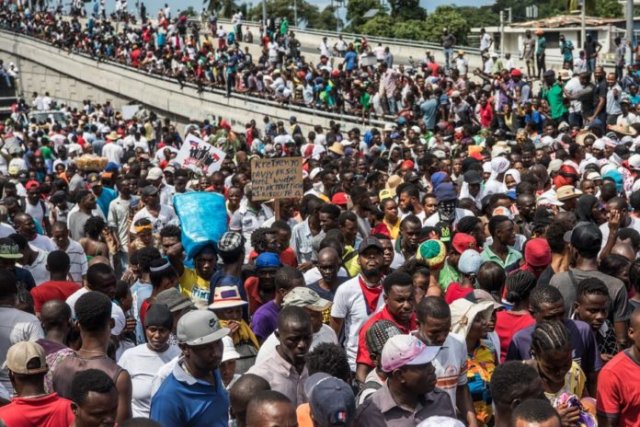
Haiti: Historic opposition agreement, 4 February 2021
Several opposition organisations and political parties have concluded an agreement that provides for and organises a National Transitional Council. This National Transitional Council must be able to ensure the implementation of the transition of governance after the expiry of Jovenel Moïse’s mandate on 7 February 2021.
Haiti: beyond the health crisis, popular self-organisation, 14 May 2020
The pandemic has come as a direct attack on the neo-liberal ideology that has been applied since the beginning of the 1980s. It calls into question the priority given to the global market over the local market, the wave of privatisation and commercialisation of public services, and the centrality of the financial capital agenda in Haiti. Specific and concrete measures must be adopted to address the crisis and provide economic and social support to the population.
Haiti: the roots of anger, 28 February 2020
Anger against "expensive life" and corruption is at the root of the social movement that has been shaking Haiti since July 2018. It was triggered by an announcement of a 38% increase in the price of petrol. This announcement came on top of the indifference shown towards the demands of textile workers for an increase in the minimum wage, as well as the vote on the budget which ratified the hijacking of public power by the elite in 2017. In addition to these challenges on the economic level, there are also those relating to the diversion of the public service mission of institutions in general.
Haiti: how women are shaking up the political world, 19 January 2020
The Haitian women’s movement is making an enormous contribution to the identification of national realities on the subjects of violence against women and girls, political participation, impunity, national sovereignty and the fight against obscurantism. They take centre stage when problems arise at the national level in order to make demands and draw up guidelines. Despite the willingness shown by the external actors who imposed themselves following the earthquake of 12 January 2010 to delegitimise them, they have managed to take an important place in political debates on many subjects.
Haiti: "beyond the barricades, women want to build the future", 12 January 2020
The women’s movement in Haiti has positioned itself in each of the crises that have traversed the country in such a way as to ask fundamental questions through unprecedented political positioning. Their struggles are illustrated on the subjects of corruption and state violence, and are at the heart of the struggle for the transformation of society. Organised outside the parties and institutions in which they are not accepted, they denounce the link between the violence of the current crisis and the toxic conception of masculinity.
Haiti: the question of insurrection, 5 November 2019
The crisis in Haiti’s power structures is reflected in the self-annihilation of the oligarchy, the dispersal of the cores of power located in Washington and US allies, and the inability of the political oligarchy to emancipate itself from the "development" agencies of the North. The process of state destruction could end if the ongoing insurgency in Haiti is transformed into a revolution. This stage has not yet been reached, particularly because of the fragmentation of left-wing organisations. In order to reach this stage, it is necessary to act for the unification of left-wing groups, the establishment of clear and comprehensible ideas for the neutralisation of the oligarchy and thuggery and the establishment of an emergency social programme.
Haiti: nothing less than a revolution, 29 September 2019
In the Manifesto of the Rassemblement des révolutionnaires ayisyens [Rally of the Ayyi Revolutionaries] (RARA), several strategic axes are proposed to carry out a national reconstruction project to solve the deep crisis that runs through the country. They relate to the defence of national sovereignty, the reconstruction of the national economy, the development of the human person, the regeneration and protection of the environment, and the overthrow of relations of domination, dependence and exploitation.
Contributions from Sonia Fayman
"Nou Pap Domi", those activists who want to reinvent Haiti, December 29, 2019
An article by François Bonnet on Mediapart that explains the birth of a political contest outside of traditional parties.
Haiti: Jovenel Moïse will only leave if he no longer has the support of international actors, February 9, 2021
An interview with Frédéric Thomas on TV5 Monde on the serious political and institutional crisis affecting Haiti.
Haiti: the PetroCaribe dossier in three words
Article by Frédéric Thomas in CETRI’s newsletter explaining the Petrocaribe scandal, the source of widespread anger in Haiti over corruption.
Huit Femmes Haïtiennes: Regards Croisés (5)
Interview of Sabine Lamour, Haitian sociologist, conducted by Frédéric Thomas.
Irresponsibility, a dominant competence
Article by Sabine Lamour on gender relations in the sphere of domination in Haiti.
Haiti: a feminist movement between ebb and flow and revival
Article in CETRI’s newsletter, by Marie Frantz Joachim, linguist and feminist activist on women’s voices in Haiti in the fields of politics and economy, confronted with violence against women.
Ms. La Lime and the Duvivier kid, February 9, 2021
With his words as a revolted writer, Lyonel Trouillot denounces the role of the international community in the crisis that has hit Haiti.
Haiti: the international community against the tide, February 9, 2021
Article by Frédéric Thomas of CETRI, on the situation in Haiti and the stakes of maintaining Jovenel Moïse in power.

